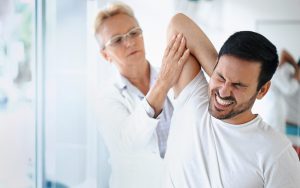People with Diabetes are Twice as Likely to Have Joint Pain

That’s because diabetes itself not only causes problems related to blood sugar, but it can also damage the bones, tendons, ligaments, muscles and nerve tissues.
Although some joint conditions cannot be cured, many can be treated using therapies like anti-inflammatory medications, steroid injections or minimally invasive surgical procedures.
If you, a family member or a friend has diabetes, it is helpful to learn about the joint conditions that are most commonly associated with the disease. That way, you can recognize any symptoms and make an appointment with your doctor for early diagnosis.
Joint Conditions Commonly Associated with Diabetes
Adhesive Capsulitis (Frozen Shoulder)
People with diabetes can be at a greater risk for frozen shoulder, a condition in which the shoulder joint gradually becomes more painful and the range of motion becomes increasingly limited. Frozen shoulder can improve by itself, but it can take months or even years. Steroids can often help.
Carpal Tunnel Syndrome
Diagnosing carpal tunnel syndrome in those with diabetes can be challenging. That’s because people with diabetes may also have peripheral neuropathy, a nerve issue that causes many of the same symptoms as carpal tunnel syndrome, such as tingling and numbness. A doctor may schedule nerve conduction studies to help diagnose the underlying issue.
Charcot Foot
This condition causes swelling in the foot (and sometimes the ankle) and can progress until it causes deformity. Other signs to look for include redness, a feeling of warmth in the foot and pain. A doctor may be able to treat it using a foot cast.
Diabetic Hand Syndrome
This disorder causes the hands to become waxy and thickened due to an excess of collagen that develops directly below the skin. This syndrome also causes finger movement to become extremely limited.
Dupuytren’s Contracture
Dupuytren’s contracture is an abnormal, painless thickening of the connective fascia tissue located beneath the skin. Eventually, it can cause a deformity in which one or more fingers stays bent toward the palm.
Osteoarthritis
People who are overweight or obese are at risk for type 2 diabetes, and they are also at risk of developing osteoarthritis because the excess weight puts more strain on their joints. When people with diabetes reach the age of 50, they should talk to their doctor about their risk, since the disease becomes more likely with age. There are several non-surgical treatment options available for osteoarthritis.
Osteoporosis
People with diabetes can be at higher risk for a bone-thinning disease known as osteoporosis. The bones can ultimately become so weak that they can break as a result of a minor fall. They can even break from something as simple as sneezing or coughing.
Trigger Finger
Inflammation of the tendons in the finger can cause it to bend, resulting in a condition called trigger finger. The finger can make a popping or clicking sound when a person tries to extend the hand or fingers. A doctor can treat it using splints, medications or if needed, surgery.
Talk to Your Orthopaedic Doctor
In addition to recognizing these signs and getting help early on, another way to better manage and minimize the discomfort of diabetes-related joint pain is exercise. Although it may sometimes be challenging to want to exercise, doing so can help improve both diabetes and arthritis. Talk to your doctor about what exercise might be appropriate for you if you have diabetes, joint pain or both.
